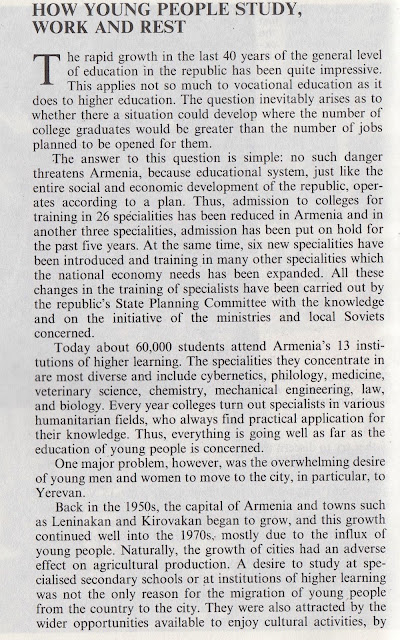Over the coming months we will be taking a look at these books and the republics. The books will be slightly edited for length and repetition in some cases and the photographs and illustrations will be dispersed more evenly throughout the text.
In our two most recent posts in the series we looked at the Georgian and Azerbijan SSRs in 1987. Written by Gevorg Oganesyan, this booklet looks at the Armenian SSR in the same year.
This installment is one of my favourites of the series as it is full of fascinating photos and is very focused on social history and development.
It begins with an overview of Armenia's lengthy and remarkable history up to and including the revolutionary period with the formation of the Armenian SSR on November 29, 1920. The book then details the incredible progress made since the revolution especially in areas like literacy, education, industry and science. Armenia become a center of astrophysics research within the Soviet Union and in 1987 had two of the four radio-optical telescopes that existed in all of Europe.
The booklet also looks extensively at Armenia's largest cities such as Yerevan and Leninakan (now Gyumri). Among the photos of these cities there is one of Yerevan's Zvarthnotts Airport which, as I have noted before, looks remarkably like the center part of the space station in Deep Space Nine.
Cultural aspects of the Armenian SSR are also delved into yielding interesting facts such as that in addition to more traditional musical forms Armenia was a major part of the Soviet jazz scene. Armenia was also home to thriving theatres that included various theatrical companies and a children's puppet theatre.
As was true across the USSR Armenia had many Pioneer groups, camps and palaces and the Yerevan Children's Art Gallery was the first in the Soviet Union to hold exhibits that were entirely made up of the art of young people. The Pioneer system, of course, was sadly dismantled with the fall of socialism.
There is information about sports, art, archaeological discoveries, environmental programs, earthquake monitoring, subsidized vacations, health spas, the expansion of university and college education and even on how the republic was working to maintain its electrical grid after having actually been the first Soviet republic to achieve 100% electrification.
(Click on scans to enlarge)














































































































No comments:
Post a Comment